4 School Readiness and
Education Program Highlights
in this section
Using the Head Start Early Learning Outcomes Framework (ELOF), all programs work towards having Head Start children that are…
Safe 🙌🏽
💟 Healthy and well
Learning and developing 📖
🍎 Ready for school
Engaged in positive relationships with family members, caregivers, and other children
😜

Curriculum and Program Practices
SETA, along with its delegates agencies and EHS partners implement a comprehensive curriculum that meets the needs of the children enrolled in the program. In the Head Start and Early Head Start center-based program option, Creative Curriculum is used. Parents as Teachers curriculum is used in the home-based program.
Desired Results Developmental Profile Data (DRDP)
Countywide, the Desired Results Developmental Profile (DRDP) is used for child assessment to measure developmental progress across multiple domains. Data is used to determine how the program has contributed to children’s growth as well as to identify areas that may need additional support.
Sacramento Countywide Preschool DRDP Data:
| Fall 2021 % of children rating in the top 3 levels of the DRDP Building (M,L) Integrating | Spring 2022 % of children rating in the top 3 levels of the DRDP Building (M,L) Integrating | Percentage of Growth | ||||
| Among English-Only | Among English Language Learners | Among English-Only | Among English Language Learners | Among English-Only | Among English Language Learners | |
| Approaches to Learning | 40 | 40 | 75 | 74 | 87.5 | 85.0 |
| Social-Emotional Development | 42 | 37 | 79 | 76 | 88.0 | 105.4 |
| Language and Literacy Development | 38 | 40 | 75 | 68 | 97.3 | 70.0 |
| Cognition, Math, and Science | 40 | 38 | 76 | 74 | 90.0 | 94.7 |
| Physical Development | 64 | 66 | 86 | 86 | 34.3 | 30.3 |
| English Language Development | 51 | 77 | 50.9 | |||
Sacramento Countywide EHS DRDP Data:
| Fall 2021 % of children rating in the Exploring Later/Building Earlier DRDP level | Spring 2022 % of children rating in the Exploring Later/Building Earlier DRDP level | Percentage of Growth | ||||
| Approaches to Learning | 60 | 71 | 18.3 | |||
| Social-Emotional Development | 57 | 77 | 35.0 | |||
| Language and Literacy Development | 52 | 66 | 26.9 | |||
| Cognition | 59 | 70 | 18.6 | |||
| Physical Development | 73 | 83 | 13.6 | |||
This means:
- In Approaches to Learning , teachers used creative ways to engage students, which included varied art materials, music and movement, sensory. manipulatives and visual representations.
- Social Emotional –Teaching Pyramid practices that align with Trauma Informed Care approaches were a focus in professional development and coaching. The use of the Second Step social emotional curriculum in collaboration with Teaching Pyramid supported children with routines, emotional literacy and conflict management.
- Language and Literacy – was supported through training and coaching on read-a-louds, use of repeated readings, correlating of literacy activities with book reading, etc. to foster increases.
- An increased STEM focus supported learning across the Cognition domain. Children are naturally inquisitive and want to explore and make sense of themselves and the environment in which they live. The emphasis of science, technology, engineering and math in the classrooms have provided ample opportunities to increase critical thinking.
- Physical Development – was supported through the implementation of The I Am Moving; I Am Learning curriculum implemented across the county to increase activity, reduce obesity in children and encourage healthy body image and well-being. SETA’s PAWS health and safety curriculum emphasized relevant topics such as masking, social distancing and hand washing
Classroom Assessment Scoring System (CLASS)®
The Office of Head Start (OHS) uses Classroom Assessment Scoring System (CLASS)® as a benchmark for high-quality teacher-child interactions. Scores are categorized into three domains. Programs use their CLASS observation results to guide professional development for teaching staff to improve and/or strengthen their interactions with children in the classroom.
- Emotional Support domain captures how teachers help children develop positive relationships, enjoyment in learning, comfort in the classroom, and appropriate levels of independence.
- Classroom Organization domain focuses on how teachers manage the classroom to maximize learning and keep children engaged.
- Instructional Support domain involves how teachers promote children’s thinking and problem-solving, use feedback to deepen understanding and help children develop more complex language skills.
Source: NCECDTL: Understanding and using CLASS for Program Improvement
Program Year 2021-2022 was the first full year of in-person learning since the pandemic’s closure.
Despite the challenges and disruptions experienced by programs, agency CLASS scores for the year demonstrated strong scores across Head Start programs in Sacramento County. Countywide average scores exceed the 2020 National Average in all three domains.
Pre-K CLASS Average Score Chart,
Sacramento County Head Start 2021-2022:
| Emotional Support (ES) Domain | Classroom Organization (CO) Domain | Instructional Support (IS) Domain | |
| SETA and 5 Delegate Agencies | 6.39 | 5.93 | 3.35 |
| National CLASS Average 2020 | 6.03 | 5.78 | 2.94 |
TODDLER CLASS Average Score Chart,
Sacramento County Head Start 2021-2022:
| Emotional Behavioral Support (EBS) | Engaged Support for Learning (ESL) | ||
| SETA and 2 Delegate Agencies | 6.28 | 5.93 | |
*No recent available National Toddler CLASS average data.
Home-Based Program
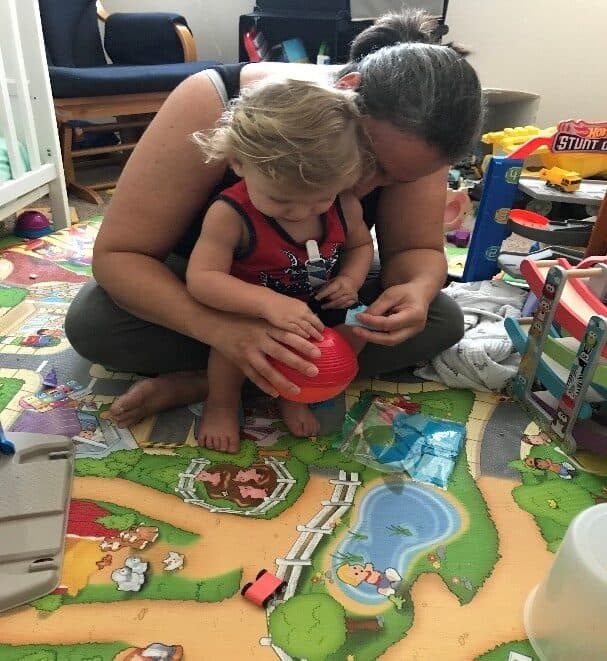
Countywide Home-Based Program – Head Start and Early Head Start
In the Home-Based Option, Head Start services are provided in the home for pregnant mothers and children ages birth to 5 years old. A Home Visitor makes weekly visits to provide comprehensive services in the family’s home. A group socialization gathering, conducted twice a month, allows children and families to mutually interact in a school setting and to learn a variety of skills and topics of interest important to the educational development of the child. SETA, San Juan USD, River Oak Center for Children (ROCC) Early Head Start, and Sacramento County Office of Education (SCOE) Early Head Start programs use the Parents As Teachers (PAT) home-based curriculum for children and Partners for a Healthy Baby for pregnant women. In 2021-2022, SETA and its partners/delegate, Sacramento County Office of Education (SCOE), River Oak Center for Children (ROCC), and San Juan Unified USD served 592 children (infants and toddlers) and 53 pregnant women in the Early Head Start home-based program. SETA served 163 children 3-5 years old in its home-based program for preschool.
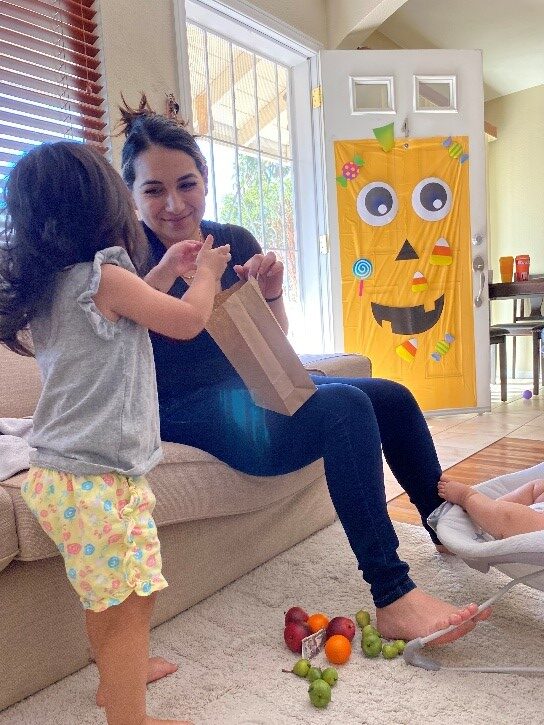
Education Highlights and Community Partnerships
Sacramento County Office of Education (SCOE) Full Inclusion
- The full inclusion preschool program began in 1990 with a collaborative effort between SETA Head Start and Sacramento County Office of Education (SCOE) Special Education Department.
- The goal of the program is to ensure children with disabilities participate in inclusive preschool settings with their typically developing peers.
- The early learning centers that currently have full inclusion classrooms are Hillsdale, Grizzly Hollow, and Northview which is scheduled to return in fall 2022.
- These three (3) centers have numerous sources of inclusive adult support in each classroom, which includes the Head Start staff and SCOE staff who provide a high-quality and developmentally appropriate curriculum. The preschoolers are very helpful as well and serve as models to each other.
- Valuable resources that SCOE provides as part of the partnership:
- Training and professional development to staff (both programs)
- Specialists to provide individualized services to children e.g. speech therapists, occupational therapists, nurses, etc.
- Access to information in order to individualize services for children with special needs
WestEd Math Project
SETA has partnered with WestEd, a non-profit education research agency, to conduct a study of a math tutoring program for pre-kindergarten children who are behind in their math development. Previous studies showed that the curriculum, Pre-K Mathematics Tutorial (PKMT) caught children up and was helpful in addressing pandemic-related learning loss. Twenty-two (22) SETA classrooms are participating in the project and identified students are provided hands-on math experiences in small groups 5 days per week. These math activities are taught according to a research-based scope and sequence of learning objectives. Teaching staff also received professional development hours on how to strengthen math concepts in their classrooms.
California State University, Sacramento (CSUS)
A longstanding partnership with CSU Sacramento has continued to provide student volunteers to support children’s learning. The partnership provides 20-30 students each semester who serve as SETA substitute teachers in the Head Start and Early Head Start classrooms. The students are enrolled in work participation college coursework that blends practical learning theories in early care and education with hands-on experiences in the preschool and infant/toddler classrooms.
JumpStart provided eighteen (18) college students that were located at six (6) Head Start locations. They provided additional curriculum activities that focused on literacy and social-emotional skills. Results from a recent study found that JumpStart children make 1.5x greater gains in important literacy skills, as compared to those who don’t receive the JumpStart program.
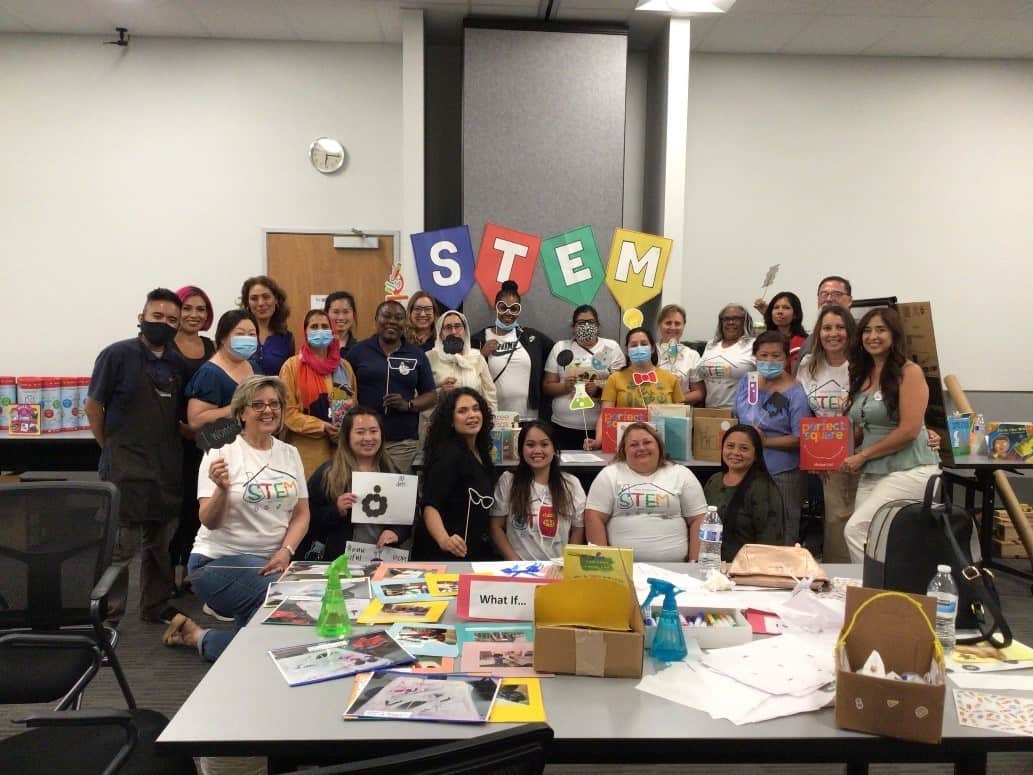
Head Start staff and CSUS JumpStart student volunteers
Portfolio Pilot Project
In an effort to increase authentic observations and engage families in the assessment process, six (6) centers participated in a Guided Observation Pilot. Home activities aligned directly with DRDP measures were provided to families. Parents facilitated the lessons with their children while enhancing their own observation skills.
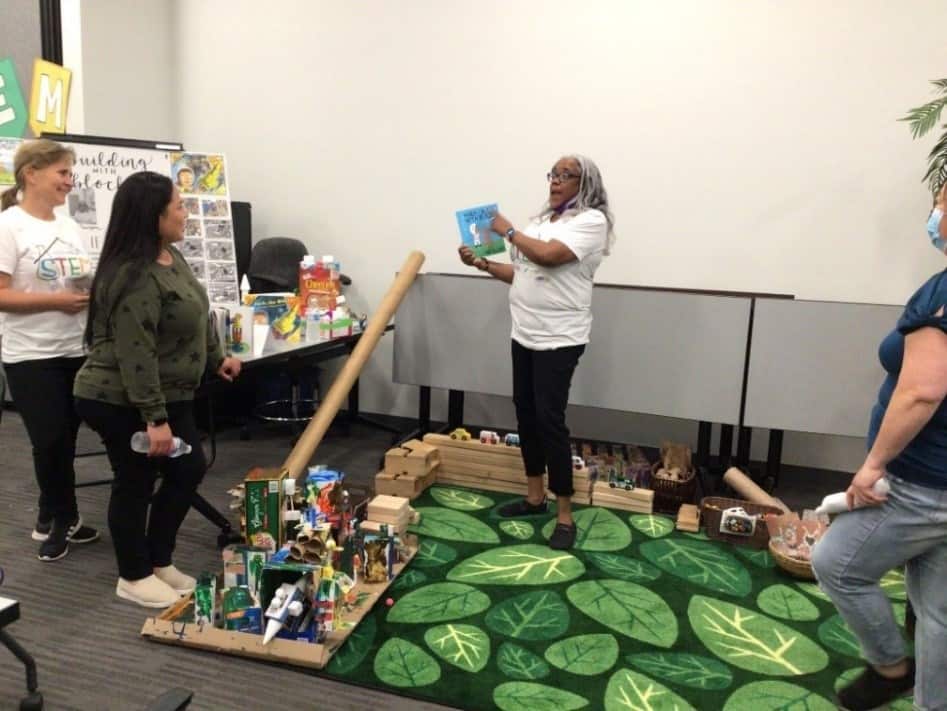
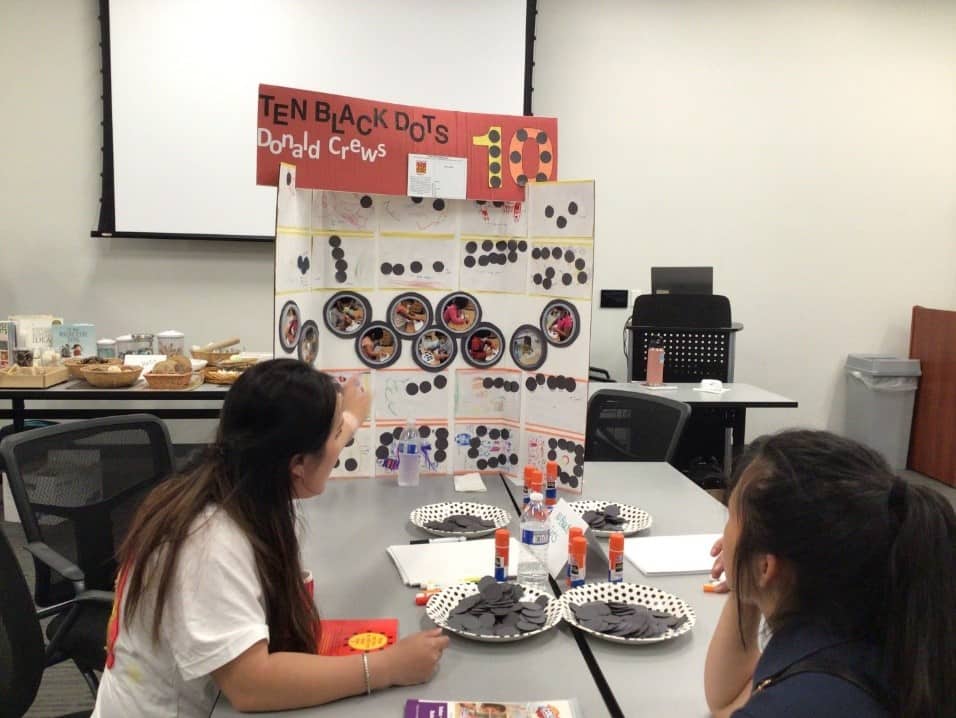
STEM (Science, Technology, Engineering, and Math)
STEM continues to be a concentrated curriculum area for Head Start teachers. STEMfest, a professional learning event was held this year and it included teacher-led peer training to share ideas on how to bring STEM to life in the classroom. Teachers have integrated new and exciting approaches to these concepts into the lesson plans.
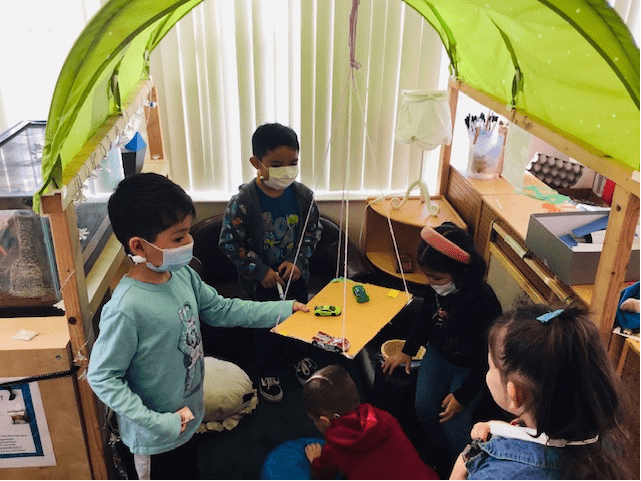

Building structures with blocks is a STEM activity enjoyed by students.
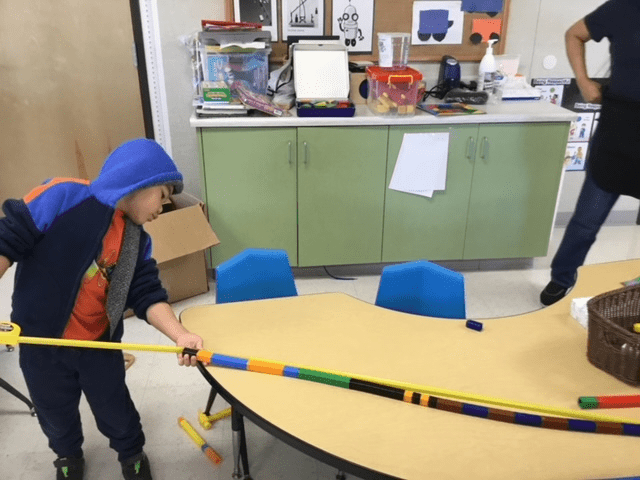
Head Start child uses a builder’s tape to measure his project.
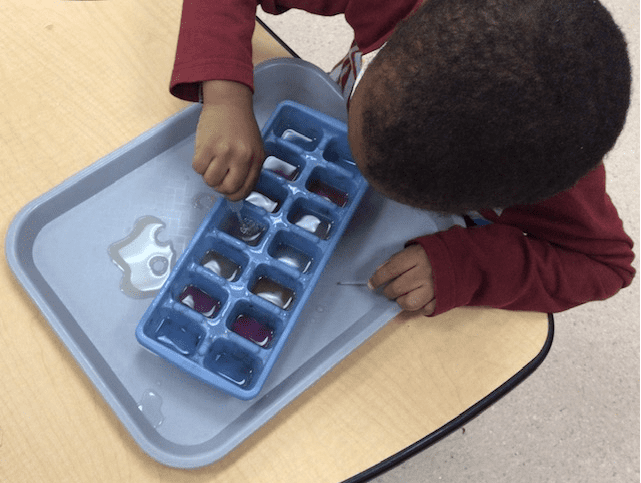
Having fun with experimenting with colors.
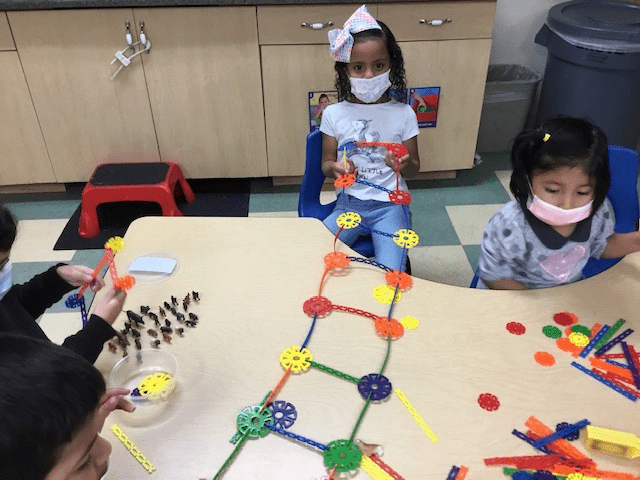
STEM Program.
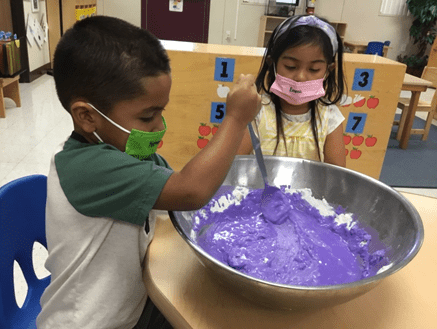
Shared materials and waited her turn. Meets these measures: ATL-REG4: Curiosity and Initiative in Learning, ATL-REG7: Shared Use of Space and Materials, SED4: Relationships and Social Interactions with Peers
Investing in Staff with Professional Development
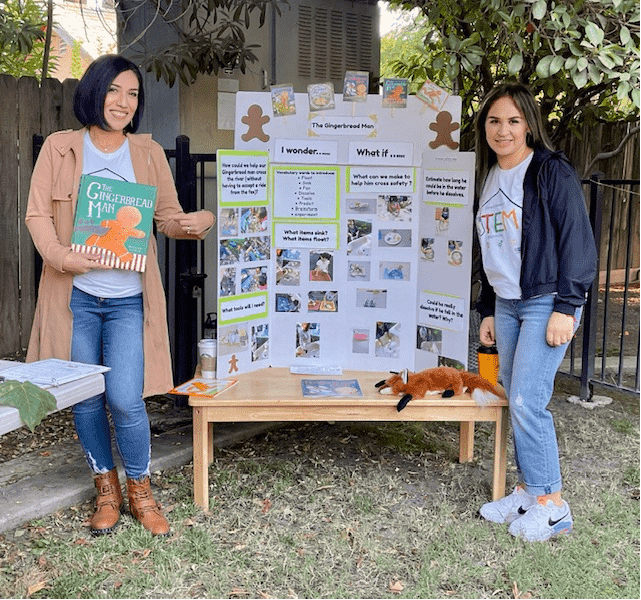
A sample of professional development opportunities for staff:
- Summer Series: Four (4) evenings of engaging training were presented to staff. 2 nights were in a virtual setting and 2 nights were in-person. Topics included STEM, Transitions, Brain Development and Literacy.
- Trauma Informed Care: a 6-hour session was offered to help teachers understand trauma as well as its impact on young children’s brains, behavior, learning, and development. The training introduced trauma-responsive and resilience-building teaching strategies to create strength-based environments that support children’s health, healing, and resiliency.
- New Supervisor Series: New Supervisors are sharpening their skills with a Teaching, Learning, Collaboration (TLC) group developed just for supervisors. Focus areas are Human Resource processes, coaching and mentoring staff, understanding monitoring, licensing, and compliance.
- Staff Wellness: Staff Wellness has been an intentional focus with access to online mental health resources, and workshops on topics such as the foundations of wellness and managing change. Wellness is integrated into site meetings with the support of mind, body, and spirit.
Early Childhood Education (ECE) Apprenticeship Program
In an effort to grow and nurture a new generation of teaching staff and address staffing needs, SETA has partnered with the Los Rios Community College District to offer an Early Childhood Education Apprenticeship program. While this opportunity is available to the public, the focus of this program is to engage and support Head Start parents who have an interest in working in early care and education but do not have the college units or experience to begin their career. This DIR-approved program allows the apprentices to work at SETA as a regular employee without the requisite early childhood education units and ECE experience. While in the program, the apprentices will work at least 30 hours per week and take one class each semester. At the end of the two-year program, the apprentices will have the 12 units necessary to qualify for a state awarded Associate Teacher permit.
In addition to the work experience and the college cohort, apprentices participate in monthly support meetings with SETA’s educational team. This is an opportunity for the apprentice to share their experiences, ask questions and get additional professional development in a supportive and collaborative environment. The SETA Site Supervisors who serve as mentor teachers receive additional support and coaching on their role as a mentor. Lastly, in partnership with Sacramento County Office of Education, the apprentices will also be provided additional training through the California Preschool Instructional Network (CPIN).
SETA currently has 27 apprentices participating in the program, 18 of whom are current/former Head Start parents. This apprenticeship program is registered with both the State and Federal Department of Apprenticeship Standards, paving the way for SETA to apply for additional funding to support the project beyond its two-year project period. This is a win-win proposition as it will address the agency’s need for a well-trained teaching workforce while being advantageous for individuals who might otherwise not enroll in college and/or need additional support and mentoring in order to be successful in meeting their educational goals to work in the field of early care and education.


